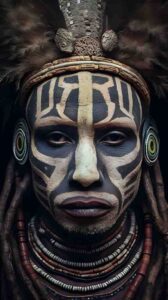Unveiling the Enigma: Exploring the Culture and Traditions of Africa’s Darkest Tribes
Introduction:
Africa, the cradle of humanity, is home to a vast array of indigenous tribes, each with its own unique culture, traditions, and way of life. Among them, there are tribes that have been historically referred to as the “darkest” due to their remote locations, lesser-known customs, and mysterious allure. In this article, we embark on a journey to unveil the enigma surrounding Africa’s darkest tribes, shedding light on their cultures, rituals, and contributions to the rich tapestry of African heritage.
The Context of Darkness:
Before delving into the intricacies of these tribes, it’s important to address the term “darkest” in its historical context. The label “darkest” was often used by explorers and anthropologists to refer to tribes residing in remote, densely forested areas or regions with limited contact with the outside world. However, it’s crucial to recognize that this terminology can carry colonial connotations and should be approached with sensitivity and understanding of its implications.
Exploring Africa’s Darkest Tribes:
1. Mbuti Pygmies of the Congo Basin:
The Mbuti Pygmies are one of the oldest and most enigmatic tribes in Africa, residing deep within the dense rainforests of the Congo Basin. Renowned for their diminutive stature, hunter-gatherer lifestyle, and deep spiritual connection with the forest, the Mbuti Pygmies have maintained a way of life largely unchanged for millennia.
2. Hadza People of Tanzania:
The Hadza people, often referred to as Africa’s last hunter-gatherers, inhabit the woodlands and savannahs of northern Tanzania. With a lifestyle characterized by nomadic foraging, communal living, and intimate knowledge of their natural environment, the Hadza offer a glimpse into humanity’s ancient past.
3. San Bushmen of Southern Africa:
The San Bushmen, indigenous to the Kalahari Desert in southern Africa, are among the continent’s oldest inhabitants, with a history dating back tens of thousands of years. Known for their distinctive click languages, rock art, and deep spiritual beliefs centered around the natural world, the San have endured centuries of adversity while preserving their cultural heritage.
4. Baka People of Central Africa:
The Baka people, also known as the Pygmies of Central Africa, inhabit the tropical rainforests of Cameroon, Gabon, and the Republic of Congo. Traditionally hunter-gatherers, the Baka have a profound spiritual connection with the forest, viewing it as a sacred realm inhabited by ancestral spirits and forest deities.
Cultural Traditions and Rituals:
1. Hunting and Gathering:
For many of Africa’s darkest tribes, such as the Mbuti Pygmies and Hadza people, hunting and gathering form the cornerstone of their traditional way of life. Armed with bows, arrows, and intimate knowledge of their natural surroundings, these tribes engage in cooperative hunting expeditions, foraging for wild fruits, nuts, and roots to sustain themselves.
2. Spirituality and Animism:
Spirituality plays a central role in the lives of Africa’s darkest tribes, with beliefs deeply rooted in animism and reverence for nature. Rituals, ceremonies, and communal gatherings are conducted to honor ancestral spirits, seek guidance from forest deities, and ensure harmony with the natural world.
3. Music and Dance:
Music and dance are integral components of cultural expression for many of Africa’s darkest tribes. From rhythmic drumming and melodic chants to energetic dances and mesmerizing rituals, music serves as a means of celebration, storytelling, and spiritual communion within the community.
4. Oral Traditions and Storytelling:
Oral traditions are paramount for the transmission of cultural knowledge, history, and mythology among Africa’s darkest tribes. Through storytelling, songs, and folklore passed down from generation to generation, these tribes preserve their collective memory and reinforce their sense of identity and belonging.
Challenges and Resilience:
Despite their rich cultural heritage and profound connection to the natural world, Africa’s darkest tribes face numerous challenges in the modern era. Deforestation, land encroachment, climate change, and encroaching modernity threaten their way of life, forcing many to adapt to rapidly changing circumstances while striving to preserve their ancestral traditions.
Conclusion:
In conclusion, Africa’s darkest tribes offer a window into humanity’s ancient past, with cultures and traditions shaped by millennia of adaptation, resilience, and spiritual connection with the natural world. As we strive to understand and appreciate the diversity of African heritage, it’s essential to approach these tribes with respect, empathy, and recognition of their intrinsic value to the tapestry of human civilization. By celebrating their cultures, protecting their ancestral lands, and supporting their efforts to thrive in the modern world, we honor the enduring legacy of Africa’s darkest tribes and reaffirm our commitment to cultural diversity and preservation.